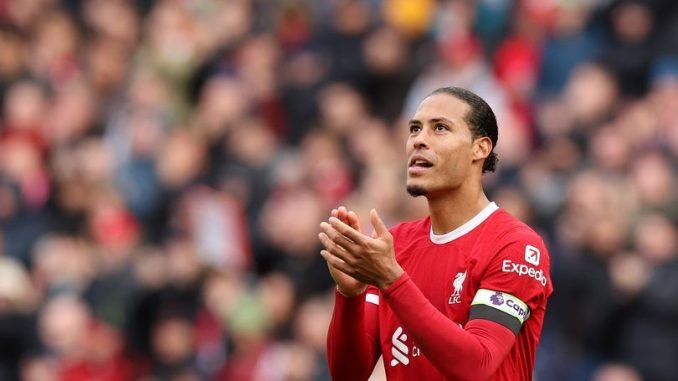
The player federation is Virgil van Dijk’s ally, and their concern is that it is “unsustainable.”

Ben Stokes and others have joined Liverpool’s Virgil van Dijk in urging greater attention be paid to players’ welfare; this call has the support of a sizable player union.
Due to the strenuous schedules that Premier League players are put to, along with athletes in rugby and cricket, there are growing worries about their physical well-being.
Virgil van Dijk, a defender for Liverpool, recently expressed his concerns during the international break, citing the present timetable in England and elsewhere as a reason for concern.
The Liverpool captain stressed the significance of placing player health first, saying: “Players are paid well, but it should never come at the expense of our health.
More and more games are required of us. We as participants should start speaking up and helping to find a solution.
Van Dijk’s remarks shed light on the issue of player welfare and the toll that excessive fixtures can take on athletes’ bodies.
The Rugby World Cup, which lasted for 51 days, and the Cricket World Cup, only slightly shorter in duration, have also drawn attention for their grueling schedules.
England cricket star Ben Stokes has previously described the current schedule as “unsustainable.”
There is growing concern that governing bodies are not adequately safeguarding the well-being of players while striving to promote and grow their respective sports.
Athletes have been warned that they may need to be selective about the matches they participate in to mitigate the risk of injuries.
Simon Taylor, CEO of the Professional Players Federation, expressed his belief that player welfare is not given enough priority within the international game, stating: “Sports need to work with their player associations to get the balance right and look after players.”
The relentless pursuit of commercial gains has led to an increasing burden on athletes, with demands continually escalating.
While players may receive substantial financial compensation, their long-term health should not be compromised.
Taylor warns that if this balance is not achieved, players may choose to withdraw from international matches or the quality of games may decline, ultimately impacting their commercial appeal.
The issue of player welfare extends beyond football and encompasses various sports.
It is crucial for sports organizations to recognize the limits of what is sustainable and ensure that they fulfill their duty of care toward athletes.
The well-being of players should be a top priority, as neglecting it could have severe consequences for both the individuals involved and the sports themselves.
As discussions surrounding player welfare continue, led by the likes of Van Dijk, it is essential for athletes, governing bodies, and player associations to collaborate in finding solutions that strike a balance between the demands of the sport and the well-being of those who participate in it.
Only through such cooperation can sustainable schedules be established, ensuring the longevity and health of athletes while maintaining the excitement and appeal of the games.
Liverpool.com says: Van Dijk is right, and he will welcome having an ally in another sport. Nor should the weight of the Professional Players Federation be underestimated; it’s a body that spans multiple sports, and the perhaps more familiar PFA is actually a member.
Pressure from the athletes themselves, as well as others within sport, is the only way to effect change. Fair play to Van Dijk for trying to lead that charge, and he can no doubt count Jürgen Klopp among his allies too.
Leave a Reply